Iran Cleric Says Raisi Will Pray At the White House One Day
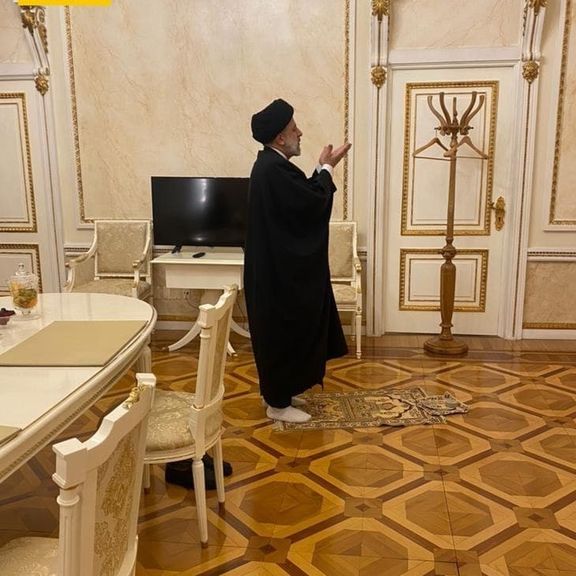
Supreme Leader Ali Khamenei's representative in Alborz province says President Ebrahim Raisi will offer Islamic prayers at the White House someday.

Supreme Leader Ali Khamenei's representative in Alborz province says President Ebrahim Raisi will offer Islamic prayers at the White House someday.
Mohammad-Mehdi Hosseini-Hamedani, a cleric, said in his Friday Prayer that Raisi’s prayers at Kremlin conveyed a very important message.
A photo of Raisi praying at the Kremlin during his meeting with Russian President Vladimir Putin has been advertised by many officials and followers of the Iranian president, including his wife that described it as a revelation of spirituality.
The photo has been used extensively in what appears to be a publicity campaign for Raisi amid public criticism of his government's efforts to expand relations with Russia and China. Among Iranians the names of both countries are associated with communism and atheism.
During their Friday Prayer sermons, representatives of Khamenei all over the country praised the image, calling it an important event.
Mohammad Ali Nekounam, the Friday Prayer leader of Shahrekord, described Raisi’s prayers at Kremlin as a “conquest” and the Friday Imam of Esfahan said it showed that “We only rely on God”.
The contents of Friday Prayer sermons delivered by Khamenei's local representative in various cities are dictated by two state bodies close to Khamenei's office, officially known as "The Policy-making Council for Friday Prayer Imams" and the "Friday Prayer Headquarters," both dominated by hardliner clerics.
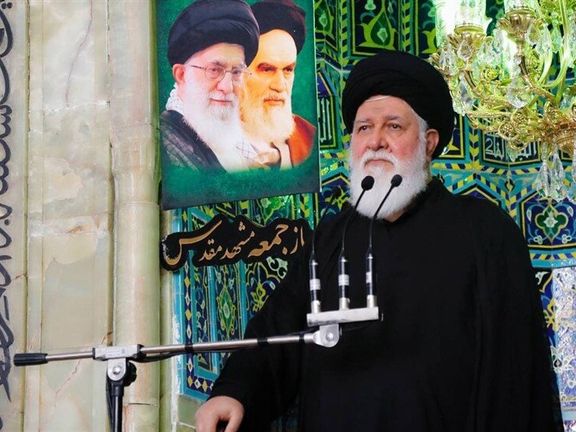
Iranian hardliner cleric Ahmad Alamolhoda says women with loose-fitting hijab should not feel secure in public, urging people to express hatred towards them.
During his Friday Prayer sermon, Alamolhoda – Ali Khamenei’s representative in Mashhad and father-in-law of Iran's President Ebrahim Raisi – said that women with loose hijab should feel the hatred, stressing that “expressing hatred and disgust for a woman without hijab is a divine duty”.
“People should solve the problem, not the police”, he said. His remark could be seen as a green light for religious zealots to confront women in the streets and cause harm.
Similar calls for crackdown on those who fail to comply with compulsory hijab by other hardliners sparked a series of acid attacks on women in Esfahan in 2014.
He also talked about an official ban on women not to enter soccer stadiums, saying, “Stadiums are a place of excitement”, stating that women should not be excited in the presence of men.
His comments came less than a month after hundreds of Iranian social media users protested to compulsory hijab and the ideology the government is imposing on them, trending the hashtag #LetUsTalk.
A report by the parliament's research center in 2018 said the number of Iranians who believed in mandatory hijab had waned. According to the report those who considered the hijab a value that could be stipulated in law had fallen from 85 percent in the early 1980s to around 35 percent.
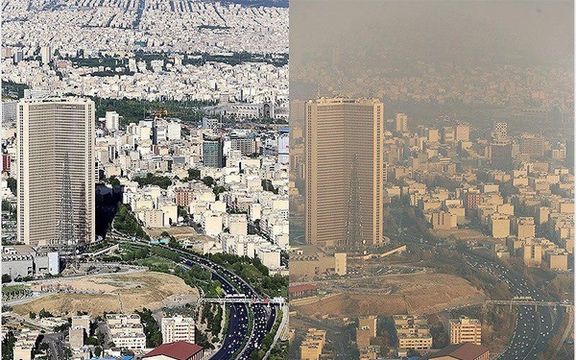
With a cold spell gripping Iran this week, shortages of natural gas have become acute and power stations are burning more dirty fuels, feeding air pollution.
Turkey’s announcement on Thursday that Tehran has cut gas deliveries signals the critical situation Iran is facing in keeping its own citizens warm and providing electricity. The country has the second largest reserves of natural gas in the country but is barely able to satisfy domestic demand.
An article published by the Islamic Labor News Agency (ILNA) in Tehran on Friday provides a bit more details about the natural gas crisis, based on information from an official of an industry group representing companies that run power plants in Iran.
Mohammad-Reza Zahed told ILNA that power plant operators are not happy when they are forced to use mazut, a dirty, unrefined oil product that most countries have banned. The fuel harms power plants and leads to heavy pollution in urban centers, but they have no choice as they gas deliveries in winter and summer are halved.
Electricity generation in Iran needs around 220 million cubic meters of gas per day, while in January deliveries declined to 100 million cubic meters. The government that controls fossil fuel production, cannot export mazut in large volumes and power plants have no choice but to use what is delivered to them.
Officials in recent weeks have already warned of high smug and pollution in cities, especially as precipitations and high winds of the past ten days comes to an end.
Iran’s gas fields, suffering from lack of Western technology and investments, are not able to keep up with domestic demand. Zahed told ILNA that annual consumption stands at 210 billion cubic meters (7.4 trillion cubic feet). Residential and commercial consumption is 105 billion cubic meters, while power stations use 60 billion and heavy industry another 40 billion cubic meters of gas.
Zahed also revealed another interesting information. Power stations must pay fines for pollution while they have no choice in burning mazut, which the government imposes on them.
The industry insider blamed lack of gas deliveries also on the distribution system, explaining that pressure in pipelines fall off because of insufficient pumping capacity. He added that power plants in the south of the country get more gas because of their proximity to production sites, while plants in the north have to rely more on mazut.
Mohsen Khojastepur, general director of the Iranian national oil company said in October that if investments in the gas industry are not secured to the tune of $50 billion, Iran will become a net importer in the coming years.
Oli minister Javad Owji has said that around $150 billion is needed to revitalize oil and gas production, but Iran has been hit by US banking sanctions and is isolated from the international financial system. Even without sanctions, few investors would risk large lending to Iran, knowing about the risk of unexpected developments related to its domestic and foreign policies.
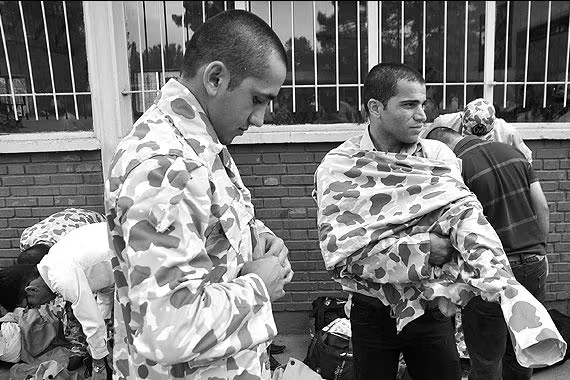
Iran says all the expats who haven’t served their compulsory conscription can pay €15,000 ($17,000) to buy their freedom from military service.
A member of the budget committee in the Iranian parliament, Mohammad-Reza Mirtajodini, said the plan only includes the absentees who are living abroad and at least five years have passed from their conscription due date.
He said the purpose of this law is that these people do not face any problem in traveling back to the country.
The new price for the service is in line with President Ebrahim Raisi’s efforts to encourage expats to return and invest in Iran’s cash-strapped economy that is struggling under heavy inflation and international sanctions.
According to Iran’s constitution, all men over 18 years old must serve in the military for about two years otherwise they cannot apply for a passport to leave the country. Most of them are drafted into the traditional Army, but some with the right connections serve with the Revolutionary Guard where conditions are much better.
In some especial cases, including being accepted by foreign universities, they can pay a hefty deposit and postpone their service, but the money is not refundable if they stay out of the country beyond the timespan of their education.
The offer is unlikely to have resonance among expat Iranian, who mostly left the country because of economic and social pressures.

Iran's first lady says her husband's much advertised praying at the Kremlin during his meeting with the Russian president "revealed the meaning of spirituality".
"The President's conduct at Kremlin Palace revealed the meaning of spirituality. His prayer highlights his government's spiritual dialogue," Jamileh Alamolhoda told female seminary students at Al-Zahra University of the religious city of Qom. She added that the Iranian media should "properly elucidate such moves".
Iranian media Wednesday published a photo showing President Ebrahim Raisi standing to prayer on his own in the Kremlin where he was meeting with the Russian President Vladimir Putin, apparently during their three-hour meeting.
The photo has been used extensively in what appears to be a publicity campaign for Raisi amid public criticism of his government's efforts to expand relations with Russia and China. Among Iranians the names of both countries are associated with communism and atheism.
Critics who have been saying that the Islamic Republic is ready “to sell Iran” to Russia and China just to ensure its survival, attacked Raisi’s prayer as a political show, while he went to Moscow “to beg for help.”
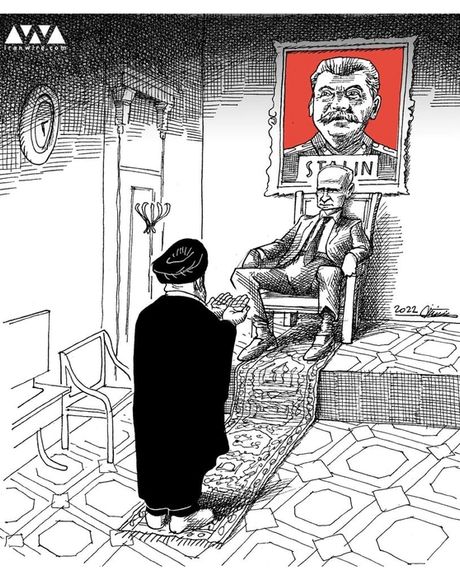
Raisi on Thursday also met with head of the Council of Russian Muftis, Ravil Einoddin, officially representing Russia’s Muslims in Moscow. According to Iranian media, Einoddin referred to the picture showing Raisi praying at the Kremlin and hailed his prayer as "super symbolic and outstanding".
According to the website of Iran's President, Einoddin told Raisi that someone from Finland sent him a message about the picture showing Raisi's prayer. "The Iranian president’s prayer 'brought blessings to the Kremlin'," the presidential website quoted Einoddin as saying.
The quotes from Einoddin have been widely circulated by Raisi supporters on social media, who called his act "a very important political and diplomatic message". They have also mentioned the "first prayer" at the Kremlin by the former Revolutionary Guards (IRGC) Qods Force commander Ghasem Soleimani during one of his visits to Moscow, which they say paved the way for Raisi's feat.
Quoting several social media post exalting Raisi's display of faith at the Kremlin, Iran's state-run television IRIB in a report Thursday said Raisi's religious gesture in the middle of his meeting with the Russian president has sparked "tens of political analyses".
Yet others have mentioned a letter in 1989 that Ayatollah Ruhollah Khomeini, the founder of the Islamic Republic, sent to then-Soviet-leader Mikhail Gorbachev. In the letter he advised the Russian leader to study Islam and predicted the end of communism.
"None of the former Soviet leaders could imagine the representative of the most important religious ideology [in the world] would one day stand to prayer in the Kremlin Palace and to flaunt "political Islam" to the world," Mehdi Andarziyan, an "America and Zionism researcher" according to his profile, tweeted.
Publisher Farhad Fallah shared a photo of Raisi's prayer and an image in a Spanish language book that depicts Soleimani's prayer at the Kremlin. "Soleimani's prayer at the Kremlin is now a model for children in Latin America. These scenes may be ordinary to us but for others they are educational," he wrote.
Another Raisi supporter said on Twitter that the publication of the photo by Iranian authorities bore the message that "the thinking once formed on the basis of atheism" has been defeated. "God willing, after the annihilation of liberalism, some day soon, we will hold Friday prayers at the White House," he promised.
In a Telegram post Thursday, conservative journalist Mohammad Mohajeri said finding fault with performing religious duties is wrong, but the publication of the photo was "a sign of inexperience and maladroitness of the government media team and "very novice-like".
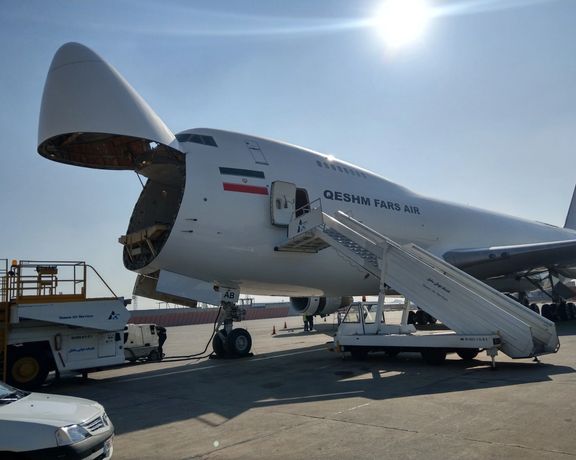
Flights by a sanctioned Iranian airline affiliated to the Revolutionary Guard to Myanmar have raised speculation of secretive military-to-military cooperation.
In an article published by Asia Times on Thursday, diplomatic sources based in Southeast Asia said the recent landings by planes owned by the Iranian cargo airline Qeshm Fars Air may have taken place to deliver weapons including guided missiles.
The sources said an Iranian delegation that landed in Myanmar on January 13 was either the second or third to visit since the military seized power in a coup on February 1, 2021.
According to data by flight tracker Flightradar24, a plane flew from Mashhad, Iran’s second-biggest city, to Myanmar last week and returned to Iran the following day.
Zin Mar Aung, the foreign minister of the shadow National Unity Government, said, “This is the second time I have noticed an Iran flight. It is understood [to be] communication related to military technology”, adding that “military relations between [Myanmar’s] military junta… and a country like Iran can be said to be a worrying situation, not only for atrocities against the Myanmar people but also from a regional and international security perspective”.
The US Treasury in 2019 imposed sanctions on Qeshm Fars Air that is linked to designated Iranian airline Mahan Air and Iran’s Islamic Revolutionary Guard Corps-Qods Force for allegedly transporting weapons to Tehran-backed groups Fatemiyoun Division and Zaynabiyoun Brigade in Syria.